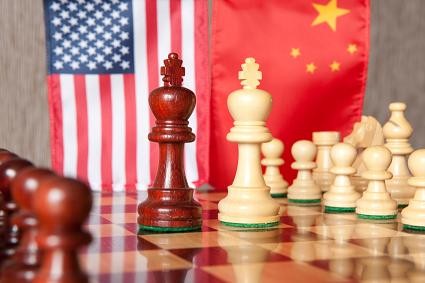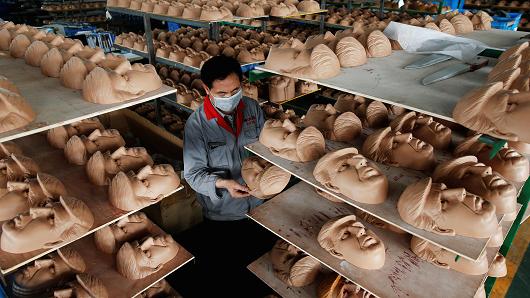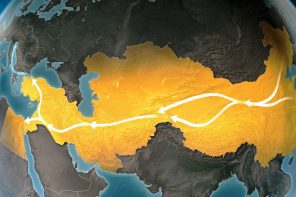This is the first US presidential election that I have been following from the primary campaign till the very end when the president is elected. I am sure this is also the first for many, not only those who happen to be abroad in the US during the campaign, but also those who are simply attracted by the unconventional and entertaining candidates as well as the democratic process that produces them. Therefore, even after I came back to my home country China from Washington DC seven months ago, I still watched every single debate (though this time without a drinking game), felt the anger from my American friends through their Facebook comments, discussed with my colleagues in the office who were also following the campaign, and specially paid attention to the reaction of my Chinese friends around and Chinese media to the election. In this article, I will demonstrate Chinese perception of this US presidential election and how the outcome might influence the US-China relations.

DO THE CHINESE CARE ABOUT THE US ELECTION?
THE PUBLIC
After the second TV debate between Hilary Clinton and Donald Trump, a series of parody videos that modify the debate clips to Karaoke music videos – a popular Chinese entertaining activities where a group sings along with the music videos with subtitles – went viral on Chinese social media. Never has a US presidential election before drawn as much attention from the Chinese public as this one. In previous elections, most ordinary Chinese may have trouble even naming the candidates. One of the reasons for this contrast is Chinese people’s familiarity with the candidates. No other previous presidential candidate is as well-known in China as Hillary Clinton. Her autobiography “Living History” was translated and published in China back in 2003 when she was still the First Lady and became a best seller in China. Donald Trump, on the other hand, though was barely known to most Chinese people before the election, has a dramatic stage performance and provocative rhetoric, which makes him more approachable for the foreign audience who has rather little knowledge of the candidates.
Another reason for the higher interests from the Chinese for this election is the “entertainment” brought by this campaign. The effect of this entertainment on Chinese attention to this US election is further enhanced by the booming social media in China. Even though the debates are not broadcasted on official Chinese TV, the videos with Chinese subtitles can be found easily on the internet the day after the debate. Moreover, as more Chinese are going to the US for travel, schools, or work, their activities on the social media reacting to the US election also spillover to influence their friends in China and their interests to US politics.
As Baum’s model of the link between entertainment soft news seeking and the rise of foreign affairs consciousness indicates , Chinese public’s interests to the US election campaign extend from mere attraction by the entertainment to greater curiosity of each candidate’s policy or even US electoral process and its democratic system. A good example is the search result of “US Election” on Zhihu, a Chinese Quora, where the user posts a question for highest rated responses. Before the election day, the top two US election related questions with most reactions on Zhihu are “How come that when Donald Trump speaks bad about Chinese, it does not irritate Americans, but when he speaks about Muslims, they are irritated? ” (a question about the US system) and “What is the most bizarre outcome you can think of of the 2016 US presidential election? ” (Responses are wild).
CHINESE GOVERNMENT
China-bashing has become a tradition for almost every US presidential election. In this election, the tradition carries on. Donald Trump called China a currency manipulator and “raping” the US , while Hillary Clinton blamed China for not playing by the rules in trade. Chinese government like usual did not respond to these charges. One reason for that is a simply public relations strategy that one does not want to bring itself to the debate to reinforce the argument from the other side. The other reason is that China holds a non-intervention policy when dealing with foreign affairs. It tries to distance itself from the domestic politics of the other country just as it does not want a foreign involvement in its own affairs.
However, even though Chinse government and its state media remain quiet to the China-bashing in the election, they always try to take the opportunity to criticize US democratic system and thus upholding the one-party system for China. The criticism nonetheless needs to be dealt with high delicacy because discussion of the party system is also a topic that the government does not want to bring under the spotlight. Fortunately, the drama of this election brings enough materials to the Communist Party that it can take advantage of. People’s Daily, a party newspaper, publishes an editorial named “US election farce demonstrates the system flaws” on October 8. In addition to the criticism about the high cost of the election campaign and money politics, which is often mentioned in previous elections, the article states that the candidates spend more time conducting personal attacks than actually debating on the policies and their governance concepts in the debates.
Criticism about US election on state media not only serves as a propaganda tool, but also reflects Chinese policy makers’ interests in learning about and from western political system. Fang Ning, Director of the Institute of Political Science of the China Academy of Social Sciences, wrote an opinion piece named “the election is a window to observe the US” in the Global Times, a nationalist Chinese state-owned newspaper. In this piece, Fang argues that as China is on the path of political development and governance modernization, China can draw lessons from US elections and its politics .
WHICH CANDIDATES DO CHINESE PREFER?
THE PUBLIC
In the spring this year, Pew Research Center conducted a survey in China – the most recent publicly available one in China – in which the question “how much confidence you have in each leader to do the right thing regarding world affairs” was asked . 37% of the respondents show confidence in Hillary Clinton, while 35% had not too much confidence or no confidence at all. As for Republican presidential candidate Donald Trump, just 22% see him favorably, 40% unfavorably. No further questions regarding the US election have been asked in this survey. When it comes to the question whom the Chinese public prefer to be the next president of the United States, the public may have a mixed interpretation. According to my personal experience in the US and my observation on the social media, most of my Chinese friends in the US, who also happens to be one of the groups of Chinese who pay most attention to the US election, determine their attitude towards a certain candidate based on the candidate’s value rather than his or her policy towards China. Their evaluation of the candidates is similar to an American. Those who prefer Clinton like her more liberal take on social issues, while those who prefer Trump like his straightforwardness. One of my friends told me that he thinks Donald Trump can win the election because “an honest bad man (jiaxiaoren) is better than a fake good man (weijunzi)”.
Another group of Chinese public that follows the election closely is the Chinese netizens who watch the foreign policy keenly. They have been widely studied among scholars who claim them to play a role in framing Chinese foreign policy making. Many of them have a long memory of Clinton serving in the office. Their feeling towards both candidates is mixed. Some share the opinions with many scholars (explained in details below). Some holds extreme views. Groups of Trump supporters in China have also been widely reported.
CHINESE GOVERNMENT
It is hard to tell which candidate that the government prefers to be the US president because the government officials are reluctant to speak in favor of a certain candidate. In September, when asked whom Beijing would prefer to be US president, Chinese Premier Li Keqiang answered that “No matter who gets elected, I believe China-U.S. ties will grow steadily and in a positive direction” and stressed that the election was an internal affair for the US . Nonetheless, many analysts have tried to answer the question. The table below summarizes most pros and cons that analysts list for each candidate during the election campaign.
| If Hillary Clinton becomes the US President | If Donald Trump becomes the US President |
| Pros | Cons |
| High predictability of foreign policy. Clinton is an experienced politician, who has dealt with China in numerous positions. | Foreign policy unpredictable. Trump has no political experience. Many polices he proposed in the campaign seem unrealistic to be implemented. |
| Existing network and ties will remain unchanged. As an incumbent party member, most of the current network and channels between US-China, including the senior officials involved can be maintained | Potential nuclear-armed Japan and Korea. Trump has insisted US allies bear more of the cost of defending against aggression, implying a possibility of allowing Japan and Korea to be nuclearized. US is the key nation to stop Japan and Korea from turning into a nuclear power. |
| Support for P2P exchange. Her support for the 100,000 Strong Initiative to send US students to study in China shows her rather benign attitudes to engage China. | Tough on trade towards China. Trump has said tough words on trade with China. He accused China of being a currency manipulator and vowed to impose trade tariffs of up to 45 percent on China. |
| US pivot to Asia. Once the State Secretary during the Obama Administration, Clinton and her administration will very likely continue the US policy of pivot to Asia, a policy that may check China’s influence in the region. | Reduction of US presence in Asia Pacific. Trump, who claimed that the US cannot be the policeman of the world, may very likely not continue Obama’s pivot to Asia policy. |
| Tough on human rights. Clinton is known for her enthusiastic advocacy of human rights in China. Her first critics of human rights issues in China can date back to as early as 1995. | Pragmatic approach on foreign policy. Trump was a businessman, who is believed to be more pragmatic on foreign policy. He might focus less on human rights issues in China. |
| Good US-China relations when a Republican is in office. Trump is a Republican Party candidate, though not a typical one. The history shows that bilateral ties are generally stronger during Republican’s administration. Republican President Nixon paved the way for the normalization of the US-China relations. US-China relations reach its highest during George W. Bush’s administration. |
HOW WILL THE US-CHINA RELATIONS GO?
On November 8, Donald Trump was elected as the US president. His foreign policy towards China may be hard to predict. On one hand, inexperienced in foreign policy, he may have to maintain a large degree of current policy and mechanism towards China and rely much on his foreign policy advisors. On the other hand, benefited from and burdened by the populism, he may have to live up to some of his campaign promises that indicates radical change in some of the policies. Taking all these into consideration, my opinion is that if Trump is going to continue with his populist approach in running the office, he will need to find a target to justify his policies and drive this populism or nationalism, as indicated in the election campaign by attacking the ineffective Obama administration. After Trump becomes the president, he will have to pick an external target. There is hardly any other country better than China to be blamed for, at least at the economic front, an area where most of the bilateral conflicts of interests occurred and where Donald Trump has most confidence about and he will focus on during his presidency. On other fronts of foreign policy, he will try to be more careful, trying not to take too aggressive an approach towards China because boosting US economy is still his priority. Minor frictions may happen as he also tries to test some policy change potential. However, any unexpected outcome or crisis, or a massive scale of trade war with China, is something he might want to avoid.

TRADE
During the campaign, Trump has mentioned imposing a tariff of 45 percent on all imports from China . His Asian policy advisor Peter Navarro has also justified 45-percent tariff claiming it well calculated in an opinion piece on LA Times in July. Even though it is questionable whether Trump is willing to risk waging a trade war against China, which is inevitable going to happen, if he proceeds with the promised scale of tariff on Chinese products, trade is an issue he can appear tough with relatively low political cost. He is very likely to take some of the aggressive measures on certain products at least during the first years of his presidency to show his determination as stressed in his Make American Great Again campaign.
Among them, a tough stance on Chinese steel and aluminum is an easy political tool because even the Obama Administration and other economies have tried to restrict the imports on these products. Moreover, boosting US steel production is also at the top of Trump’s economic agenda, so important that he has even mentioned it in his 100-day policy plan speech. However, China has plenty measures in their toolbox which it can use for retaliation. The measures can range from imposing tariffs on US products, as it has done in the past, to stopping buying certain US products, such as US air crafts and soy beans. Economists have studied outcomes of different scales of trade wars or conflicts and concludes a lose-lose situation for both countries . One of the outcome is the massive job loss in certain relevant industries and region in the US. Considering jobs is a key to Trump’s campaign, a trade war will be too politically dangerous for Trump.
Even though China makes itself an easy target to be blamed for US economic problems, one should not completely leave out a possibility that Trump will take a more practical approach towards China. In his 100-day policy plan speech, Trump, after announcing that he will issue a notice of intent to withdraw from the Trans-Pacific Partnership, said that his administration will put an emphasis on negotiating on fair bilateral trade deals. US government has already been negotiating a bilateral investment treaty with China for years. Studies have shown that such an agreement can create millions of new jobs in the US . Though such a deal might be unlikely at the beginning of Trump’s administration as he may try to take advantage of the nationalism which brings him to office, there is a chance that this deal may happen in his last years of his term to demonstrate that he is good at negotiating on good deals as he stressed in his campaign. A policy shift from China-bashing nationalism is not impossible. US normalization process with China four decades ago is a good example of how a government can suddenly start to be nice to a country that it extensively attacks in previous years.
US PRESENCE IN ASIA
Trump’s position about US presence in Asia is even more ambiguous. On one hand, he claimed to cut spending for US allies and encouraged them to defense themselves. On the other hand, he also vowed to “strengthen the US military and deploy it ‘appropriately’ in the East and China Seas”. In their recent article for Foreign Policy, Alexander Gray and Peter Navarro, Trump’s foreign policy advisor, also argued that the Obama administration has not been tough enough on security issues in Asia and on China and suggested sell more arms to Taiwan and build up US Navy .
In most football games, teams who have never played with each other before usually play rather cautiously at the first 15 to 20 minutes, in order to get to know each other first. Trump’s case may not be so different, as he is trying to get to know China from a perspective of a country leader, while China is trying to get to know Trump as a politician. He may pick some minor issues to test some policy change possibilities and as ways to get to know his competitors, such as his phone call with Taiwan. These may lead to some minor frictions in the bilateral relations. However, on major issues which have a potential to be developed into a large or unexpected crisis, he may largely maintain policy towards the region during Obama’s administration and avoid direct conflict, especially when a new network of people and communication channel between the two countries needs to be built.
GLOBAL GOVERNANCE
Many scholars have argued the US-China relations in the past two years reach a historic low point. However, fortunately, at the end of Obama administration, climate change becomes one of the very few highlights in the bilateral relations. The joint-declaration of the two countries, which demonstrated their commitment to address climate change and the success of COP conference in Paris show how two countries can cooperate to address global issues.
However, the winning of election by the climate change skeptic Trump might bring shadows to this US-China cooperation for global leadership. Recent progress by China on reducing greenhouse gas emissions has demonstrated Chinese determination in addressing climate change, while Trump has pledged to “cancel” US commitments to cut emissions . China has already called on Trump to uphold the Paris deal. We hope that he can be less stubborn on the issue, not only because that matters to the global climate society, but also because the US-China leadership gilds the bilateral relations.
Another area of global governance where both countries can find a common ground is anti-terrorism. Defeating ISIS is on the top of Trump’s foreign policy agenda, while for China, terrorism is also a key national security. However, how two countries can cooperate on the issue still remains a question. Russia seems to be a more reasonable partner for US to defeat ISIS than China, while China as usual still sees this issue from a more domestic perspective than a global one. Nonetheless, anti-terrorism may still be a potential area of cooperation for China and US in the next four years.
Many people have asked me whom I want to see to become the US president. I told them I would choose Trump, not because I agree with what he says, but because I am curious about what he will actually do and how populism works. For a student of international politics, it can be quite exciting to experience a new era. Since now he is actually elected, let’s hope it is a good one.


